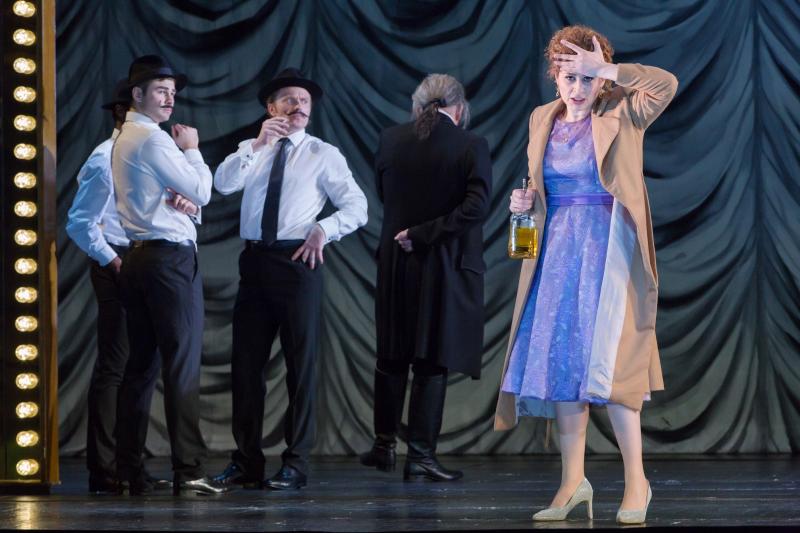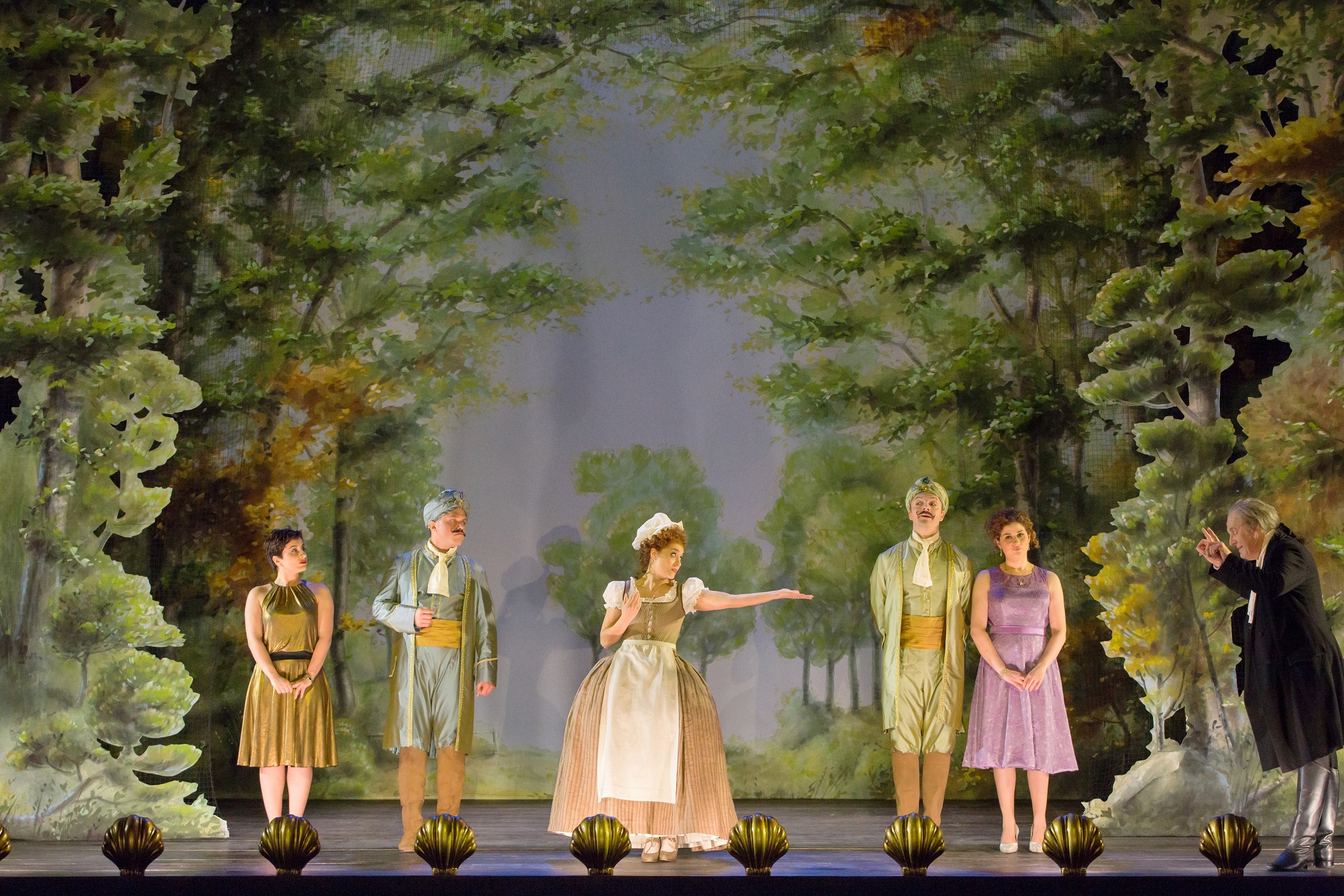Così fan tutte, Royal Opera review - fine singing and elegant deceits | reviews, news & interviews
Così fan tutte, Royal Opera review - fine singing and elegant deceits
Così fan tutte, Royal Opera review - fine singing and elegant deceits
Metatheatrical devices turn the screw on Mozart’s not-so-funny comedy of manners

Give hope to all, says Despina: play-act. Così fan tutte has always been a piece about four young and silly people being appalling to one another without much need for encouragement from a cynical old manipulator and a confused maid who, in the main, is the one character capable of arousing real sympathy.
It’s a point made literally in lights towards the close with the kind of sledgehammer obviousness that seems to have made for a long evening on the production’s original run in 2016. Or maybe that was Semyon Bychkov’s old-school tempi. The same casting principle operates for this revival, tweaked and supervised by Julia Burbach. Take five singers near the start of big careers, add one old Mozartian hand, stir in rehearsal and serve with plenty of flourish on mobile sets of piquant colours (designed by Ben Baur). It’s a cost-effective tactic, one that works well enough on a modest scale for student opera societies though not necessarily what you’d expect to see at the Royal Opera. Gloger has substituted one set of theatrical devices for another. Out go da Ponte’s tissue-paper premises of sisters, soldiers and ships, most of the time deftly elided by the surtitles. In comes a troupe of singer-actors (pictured above) trying out Don Alfonso’s proposition if only to spice up a pair of relationships already on the rocks. It’s a neo-classical Così, renewing on stage what Stravinsky rewrote on the page in composing The Rake’s Progress, and Sir Thomas Allen’s Don Alfonso goes full Nick Shadow as inscrutable fixer, black and white in costume but never in action, rich in nuance if no longer in honeyed projection.
Gloger has substituted one set of theatrical devices for another. Out go da Ponte’s tissue-paper premises of sisters, soldiers and ships, most of the time deftly elided by the surtitles. In comes a troupe of singer-actors (pictured above) trying out Don Alfonso’s proposition if only to spice up a pair of relationships already on the rocks. It’s a neo-classical Così, renewing on stage what Stravinsky rewrote on the page in composing The Rake’s Progress, and Sir Thomas Allen’s Don Alfonso goes full Nick Shadow as inscrutable fixer, black and white in costume but never in action, rich in nuance if no longer in honeyed projection.
He deserved more sympathetic support in the pit from Stefano Montanari, a Baroque violinist turned conductor who set off at an express pace and largely stayed that way, reducing many ensembles to so much bustle and gabble, though he had trouble securing ensemble no matter how broad his beat or telegraphed his cues. Stylistically at a polar extreme from Bychkov, he has stripped back the string tone and introduced a fashionably hyperactive continuo fortepiano which intensifies the workshop feel to the recitatives.
As Ferrando, Paolo Fanale supplied most of the evening’s vocal highlights, floating “Un’ aura amorosa” with unaffected feeling, and establishing a believably guarded rapport with Gyula Orendt’s Guglielmo, who filled “Non siate ritrosi” with as much charm as Montanari’s breathless speeds would allow. Paired up, Salome Jicia (Fiordiligi) and Serena Malfi (Dorabella) were more convincing than when apart, though Jicia had a nice line in assertive self-parody for “Come scoglio” and Malfi’s surrender to Guglielmo carried one of the evening’s few moments of sincere passion. Despina was sung with pertinent self-assurance by Serena Gamberoni, though it was her disguises as doctor and notary that caught the ear. Working well as a team, in an opera demanding of mutual understanding like no other, they all nonetheless projected moments of uncertainty as to how seriously we should take them, and perhaps that’s how Gloger likes it. Still, there's nothing wrong with a Così that leaves a nasty taste in the mouth, and this one ends as sourly as a bottle of cheap red.
rating
Explore topics
Share this article
The future of Arts Journalism
You can stop theartsdesk.com closing!
We urgently need financing to survive. Our fundraising drive has thus far raised £33,000 but we need to reach £100,000 or we will be forced to close. Please contribute here: https://gofund.me/c3f6033d
And if you can forward this information to anyone who might assist, we’d be grateful.

Subscribe to theartsdesk.com
Thank you for continuing to read our work on theartsdesk.com. For unlimited access to every article in its entirety, including our archive of more than 15,000 pieces, we're asking for £5 per month or £40 per year. We feel it's a very good deal, and hope you do too.
To take a subscription now simply click here.
And if you're looking for that extra gift for a friend or family member, why not treat them to a theartsdesk.com gift subscription?
more Opera
 Help to give theartsdesk a future!
Support our GoFundMe appeal
Help to give theartsdesk a future!
Support our GoFundMe appeal
 Best of 2024: Opera
Comedy takes gold over a year rich in standout performance
Best of 2024: Opera
Comedy takes gold over a year rich in standout performance
 La rondine, LSO, Pappano, Barbican review - sumptuous orchestral playing in an underrated score
Puccini's 100th anniversary celebrated in style
La rondine, LSO, Pappano, Barbican review - sumptuous orchestral playing in an underrated score
Puccini's 100th anniversary celebrated in style
 L’étoile, RNCM, Manchester review - lavish and cheerful absurdity
Teamwork to the fore in a multi-credit operatic comedy
L’étoile, RNCM, Manchester review - lavish and cheerful absurdity
Teamwork to the fore in a multi-credit operatic comedy
 The Pirates of Penzance, English National Opera review - fresh energy in clear-sighted G&S
Tenor lead shines, and conductor finds new beauties in Sullivan's score
The Pirates of Penzance, English National Opera review - fresh energy in clear-sighted G&S
Tenor lead shines, and conductor finds new beauties in Sullivan's score
 Rigoletto, Irish National Opera / Murrihy, Collins, NCH Dublin review - greatness everywhere
Sheer perfection in Soraya Mafi’s Gilda and an Irish mezzo’s Berlioz
Rigoletto, Irish National Opera / Murrihy, Collins, NCH Dublin review - greatness everywhere
Sheer perfection in Soraya Mafi’s Gilda and an Irish mezzo’s Berlioz
 The Elixir of Love, English National Opera review - a tale of two halves
Flat first act, livelier second, singers not always helped by conductor and director
The Elixir of Love, English National Opera review - a tale of two halves
Flat first act, livelier second, singers not always helped by conductor and director
 The Sound Voice Project, Linbury Theatre review - an art installation that has strayed into an opera house
A worthy project fails to ignite as art
The Sound Voice Project, Linbury Theatre review - an art installation that has strayed into an opera house
A worthy project fails to ignite as art
 The Tales of Hoffmann, Royal Opera review - three-headed monster feels baggier than ever
Offenbach left multiple choices for his swansong, but this production lacks the key
The Tales of Hoffmann, Royal Opera review - three-headed monster feels baggier than ever
Offenbach left multiple choices for his swansong, but this production lacks the key
 Rigoletto, English National Opera review - another hit for Miller's Mob
More tragic than gimmicky, this classic staging can still succeed
Rigoletto, English National Opera review - another hit for Miller's Mob
More tragic than gimmicky, this classic staging can still succeed
 theartsdesk at Wexford Festival Opera - let's make three operas
Donizetti triumphs, with help from Bernstein, Rossini, two stars and director Orpha Phelan
theartsdesk at Wexford Festival Opera - let's make three operas
Donizetti triumphs, with help from Bernstein, Rossini, two stars and director Orpha Phelan
 Albert Herring, Scottish Opera review - fun, frivolity, and fine music-making
A witty production of Britten's clever comedy that's bound to leave you smiling
Albert Herring, Scottish Opera review - fun, frivolity, and fine music-making
A witty production of Britten's clever comedy that's bound to leave you smiling

Add comment